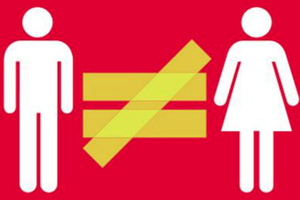 Nowhere in the article do they mention the chemical differences between men and women.
Nowhere in the article do they mention the chemical differences between men and women.
What kinds of statements about men and women constitute sexism? Is it sexist to say, for example, that on average, men are taller than women or that women live longer than men? Most people already accept the obvious truth that men and women differ in these physiological respects, and it would strain credulity to argue that such statements are blatantly sexist. Suggestions about psychological differences, however, can stoke controversy.
Pressing the issue further by claiming that psychological and cognitive differences might partly explain wage gaps, employment gaps, and the like, will certainly invite harsh rebuke and likely a charge of sexism. Like “racist”, the definition of “sexist” seems to have ballooned in such a way as to include any claim about average differences between males and females from the neck up.
…
Similarity without Sameness
Despite previous and ongoing problems, we’ve made enormous progress. For example, in Western countries like the United States and Australia more women than men graduate from universities, and the pay disparity between men and women is shrinking rapidly (though some of the gap remains as men and women scale the corporate ladder). Because there is still work to be done in the quest for female equality, many are on guard against claims that might deter women from pursuing the same goals men do. But facts are even more stubborn than pay gaps, and some extreme feminists have responded to factual claims about sex differences by flatly denying that there are two biologically distinct sexes, or by accusing those who argue for the existence of sex differences of “sexism.”
As we’ve urged for the term “racist,” we should strongly resist overextending the term “sexist,” and reserve it for people who treat one sex as superior to the other, or who fallaciously use information about sex differences to justify treating individual men or women as mere members of a group. In a prime example of linguistic overreach, Christina Hoff Sommers recently defended herself against charges of misogyny and sexism for emphasizing how small average differences between the sexes might lead to substantial differences in career choices and social interests. The fact that Sommers, a tireless advocate for equal treatment of women, might be considered a sexist for asserting that men and women are not the same is astonishing.
As irony would, perhaps, have it, some of the most compelling insight regarding the biological differences between men and women has come from female scientists. Diane Halpern, for example, has made the case that there is strong evidence for some biologically-based differences in cognition between the sexes. These differences are generally small, and are mediated by a complex array of biological and environmental factors. But the existence of such differences is an empirical claim — it matters not at all whether we would prefer that these claims were false. Our political beliefs are uncorrelated with empirical truths.
Abilities or Interests
In fairness, charges of sexism are less likely to come when discussing violence, and much more likely to follow from assertions about differences in psychological traits across groups. More controversial is the claim (repeated by Larry Summers) that although average IQ is similar, the distribution for men and women differs such that men are more likely to be found at the high and low end of the IQ spectrum. Men are further out in the tails of the curve, as a social scientist would phrase it. This, coupled with differences in certain kinds of spatial reasoning, may go some way toward explaining why STEM majors at elite universities are more often men than women, but also why low-skilled men are becoming less employable than women, and are dropping out of the workforce at higher rates in industrialized countries.
Apart from small differences in cognitive styles, men and women often have divergent interests and temperaments, driven partly by biological differences that exist across groups. Small differences in abilities or interests can lead to significantly different outcomes — including the kinds of careers men and women choose, their relative ranking of the importance of family and career success, and even the kinds of literature and movies they enjoy. Consider too that many biological differences that exist are likely to be exaggerated by culture, as the division of labor tends to encourage people to sort themselves into college majors and job occupations that they’re reasonably good at and enjoy doing.
The more important point here, though, is that even in the absence of differences in cognitive abilities, there still may be differences in interests that can help explain different outcomes. To take one example, Steven Pinker argues that “there are consistent differences in the kinds of activities that appeal to men and women in their ideal jobs.” For example:
[T]he desire to work with people versus things. There is an enormous average difference between women and men in this dimension…And this difference in interests will tend to cause people to gravitate in slightly different directions in their choice of career. The occupation that fits best with the “people” end of the continuum is “director of a community services organization.” The occupations that fit best with the “things” end are physicist, chemist, mathematician, computer programmer, and biologist.[1]
Via Quillette